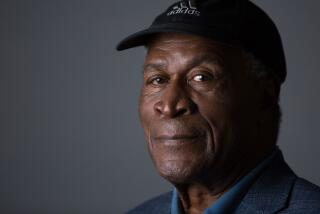STAGE REVIEW : Putting on Airs With the Karamazovs
- Share via
LA JOLLA — “Le Petomane” should be funnier.
It’s a tribute to a performer who became a French cabaret sensation by artfully breaking wind. The subtitle: “A Comedy of Airs.”
The stars are the Flying Karamazov Brothers, those anarchic New Vaudevillians, best known in the Southland for their hilarious appearance at the 1984 Olympic Arts Festival, in their adaptation of “The Comedy of Errors.”
Sounds like a can’t-miss. Maybe that’s part of the problem.
Passing gas is truly funny only when it’s unexpected. When someone inadvertently toots his own horn in the most inappropriate setting-- that’s funny.
The wind in “Le Petomane” is hardly unexpected. It was heralded in pre-show publicity, perhaps as a warning to those of tender sensibilities, and once the show begins, the buildup to the big breeze is relentless.
Throughout the first act, we see Joseph Pujol (Howard Jay Patterson) making the rounds of the clubs of la belle epoque, trying to get his big break, facing constant rejection.
His story is told as a flashback from the perspective of his 101-year-old son Louis (also Patterson), who watches a documentary he made about his famous father 39 years earlier. When the centenarian recalls Joseph finally getting a chance to go on at the Moulin Rouge, he remarks, “This is where the film really takes off.”
But it’s where “Le Petomane” really stays grounded.
Nothing could match the comic expectations that have been raised for this moment, and it falls flat. We hear a brief series of noises and we’re told what each one is an imitation of. But the scene doesn’t begin to approach the complexity of the sextet from “Lucia di Lammermoor,” which was promised in pre-show interviews.
So this is the act that out-grossed Sarah Bernhardt, in more ways than one? It’s hard to believe.
Paul Magid’s script doesn’t acknowledge the gap between expectations and results. The general irreverence that’s on display does not extend to any questioning of Pujol’s stature as an artist--except through the mouth of his son at age 62, when he narrated his movie about his father.
Even Pujol fils doesn’t challenge his father’s artistry as much as his propriety. The on-screen son represents everyone who might frown on Pujol’s act as distasteful--and by implication, those modern-day censors who try to stifle free-thinking, free-spirited art.
Yet it’s the son, not the father, who’s the only butt of the joke here. He’s regarded as a hopelessly repressed stick-in-the-mud, not only by the Karamazovs, but especially by himself 39 years later, as he watches his younger self on film. The old man leads the catcalls, hooting that he used to be a “jackass.”
Actually both father and son are stick figures. The purpose of “Le Petomane,” it turns out, is not to explore anything so weighty as the father-son relationship or the threat of censorship. It’s to allow the Brothers to show off in a fin de siecle context.
Much of the show has very little to do with Pujol, its purported subject. Instead, it consists of the Brothers’ evocation of the other acts that performed in the same clubs where Pujol was trying to get work. Some of these are fairly inspired bits of comic mayhem; others are not.
A quartet of comics who parody the Germans takes too long getting the action started, though their “executions” of audience members drawn from the cabaret seating at the front of the house is certainly a novel idea. A pseudo-Japanese fan dance that follows is lackluster.
It’s fun to watch the Karamazovs in tutus and pink tights doing a mock ballet, though fans of Les Ballets Trockadero de Monte Carlo, which also dances in drag, may be less impressed.
Just before intermission, new Brother Michael Preston performs Offenbach with his feet, atop a giant marimba, and audience members are drafted into doing an amusing onstage cancan; if you care whether you’re part of the pool from which the participants are drawn, mention that when you order your tickets.
There is one perfect moment of mooning. And in the last act, the film and the stage planes crisscross in a zany, just-for-fun exhibit of Grand Guignol.
Actually, there are too many last acts; the Karamazovs appear to be trying out a series of endings. One such ending even gives us some juggling, for those who expect the Brothers to juggle. Finally, after the audience has begun to leave the hall, another short film appears on the screen.
Who knows--maybe there was still another added attraction after we were all gone.
Sam Williams: The General
Paul Magid: Jarry
Howard Jay Patterson: Joseph/Louis Pujol
Michael Preston: Satie
Indiana Rogers: Little Girl
A La Jolla Playhouse production. Conceived by the Flying Karamazov Brothers and Robert Woodruff. Written by Paul Magid. Le Petomane’s act written by Howard Jay Patterson. Directed by Robert Woodruff. Set Douglas Stein. Costumes Susan Hilferty and Candice Cain. Lights John Martin. Music Doug Wieselman. Sound James LeBrecht. Ballet choreography Doug Elkins. Film production Barb Mikulak. Stage manager Andy Tighe.
More to Read
The biggest entertainment stories
Get our big stories about Hollywood, film, television, music, arts, culture and more right in your inbox as soon as they publish.
You may occasionally receive promotional content from the Los Angeles Times.










